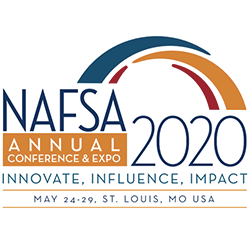Sessions and Workshops
The NAFSA Annual Conference each year typically hosts over 200 sessions and over 40 preconference workshops. Both sessions and workshops should be created with a specific audience in mind and a clearly defined content focus area. NAFSA has 12 content focus areas for submitters to consider when submitting their proposal.
Please view our session and workshop proposal templates to plan your proposal today!
- Session Proposal Template (including Career Center)
- Workshop Proposal Template
| Content Focus Area | Description |
| Advising and Enrollment in International Education | Information, tools, and training that showcase good practice, developments in the field, research, knowledge, and the use of emerging technologies, as it applies to advising and enrollment in all areas of international education. |
| Advocacy | Strategies and tactics for advocating the value of international education on campus, locally and nationally within the U.S. and abroad. |
|
Comprehensive Internationalization |
Infusion and assessment of international and comparative perspectives throughout the teaching, research and service missions of higher education. Strategies and tactics for articulating the value of international education on campus. |
| Diversity and Inclusion | Research and applied practice on social justice, equity, civil society, and/or ethical practice related to diversity and inclusion and the work of international educators. |
|
Global Issues and Trends |
Global trends and international developments that have an impact on international education, including developments in such areas as national interests, politics, economics, security, higher educational policy, society, the environment, or workforce development. |
| Innovations in Recruitment and Marketing | Innovations in recruitment and marketing including, digital recruitment, use of social media, return on investment, communication strategies, branding, public relations and/or market trends, data and analysis. |
|
Management and Strategy |
Models, policies, and practices for management of an office or program in international education, or principles, methods, and leadership strategies for strategic planning and policy making in order to achieve the goals and mission of international education within an institution or organization. |
| Peace and Justice |
Innovative and influential efforts by international educators across the globe to advance issues related to strengthening social justice and promoting peaceful international cooperation in all spheres of common human endeavor. |
|
Professional Development |
Development of skills and strategies that will help international educators achieve career goals, reach leadership potential, and find balance between personal and professional life. |
|
Promoting Safety, Mitigating Risk, Responding to Crisis |
Tools, communication processes, compliance, strategies, and planning that campuses and international offices use when faced with a crisis, health emergency (mental or physical), or safety concern in international education. |
|
Regulatory Complexities |
Guidance and information on government regulations in the United States and abroad that impact international education, employment, and exchange. |
|
Student Preparation and Career Development |
Career readiness of both international and domestic education abroad students; skill and language acquisition; development of intercultural competencies; transition to workforce; employer expectations. |
|
Teaching and Learning in International Education |
Development of curriculum for and integration of global learning pedagogy into teaching and learning. Research, theory, and model practices that support the development of global competence across all disciplines. |


